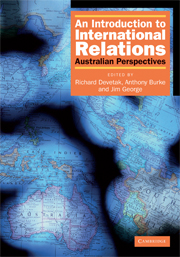Book contents
- Frontmatter
- Contents
- List of tables, figures and boxes
- List of contributors
- Preface and acknowledgments
- An introduction to international relations: the origins and changing agendas of a discipline
- 1 Theory and practice in Australian international relations: the search for identity and security
- Part 1 Theories of international relations
- Part 2 The traditional agenda: states, war and law
- Part 3 The new agenda: globalisation and global governance
- 20 Multilateral economic institutions
- 21 Global trade
- 22 Global finance
- 23 Non-state actors: multinational corporations and international non-governmental organisations
- 24 Global poverty and inequality
- 25 Globalisation and its critics
- 26 The globalisation of Islam
- 27 Global terrorism
- 28 Humanitarianism and armed intervention
- 29 Human rights
- 30 Migration and refugees
- 31 Global environmental politics
- 32 Global governance and the United Nations
- Glossary of terms
- Bibliography
- Index
- References
25 - Globalisation and its critics
from Part 3 - The new agenda: globalisation and global governance
- Frontmatter
- Contents
- List of tables, figures and boxes
- List of contributors
- Preface and acknowledgments
- An introduction to international relations: the origins and changing agendas of a discipline
- 1 Theory and practice in Australian international relations: the search for identity and security
- Part 1 Theories of international relations
- Part 2 The traditional agenda: states, war and law
- Part 3 The new agenda: globalisation and global governance
- 20 Multilateral economic institutions
- 21 Global trade
- 22 Global finance
- 23 Non-state actors: multinational corporations and international non-governmental organisations
- 24 Global poverty and inequality
- 25 Globalisation and its critics
- 26 The globalisation of Islam
- 27 Global terrorism
- 28 Humanitarianism and armed intervention
- 29 Human rights
- 30 Migration and refugees
- 31 Global environmental politics
- 32 Global governance and the United Nations
- Glossary of terms
- Bibliography
- Index
- References
Summary
Introduction
The purpose of this chapter is to introduce the contemporary theoretical debates surrounding globalisation. It illustrates the main features of protests against the social consequences of a globalised economy, and it identifies some of the key political issues that scholars and students of International Relations must face when addressing the promotion of justice and effective governance within a more densely connected world.
Since the mid-1990s the term globalisation has entered common usage and become a central issue in public debates in most countries around the world because of the apparently changed structure of world politics and economics. Globalisation has become associated with the controversial social outcomes that have stemmed from an increasingly integrated global economy, and the resulting public disquiet and controversy around the world, as particularly symbolised by the 1999 protests in Seattle against the World Trade Organization (WTO). Globalisation has also become an important – although essentially contested – concept within the field of International Relations and other social science disciplines. It is therefore essential to try to understand what globalisation means.
Understanding globalisation
Globalisation is a messy term that encompasses a wide variety of human activity. As you may be aware there are trade statistics and other economic facts that suggest the world is becoming increasingly globally integrated (Held et al 1999: 169–75). Nevertheless facts do not tell the whole picture. Consequently, in an effort to systematise the examination of globalisation, a variety of scholars have advanced arguments about what globalisation means.
- Type
- Chapter
- Information
- An Introduction to International RelationsAustralian Perspectives, pp. 295 - 306Publisher: Cambridge University PressPrint publication year: 2007



